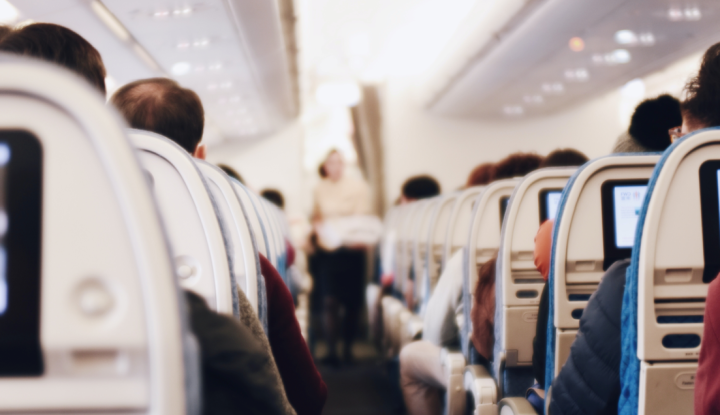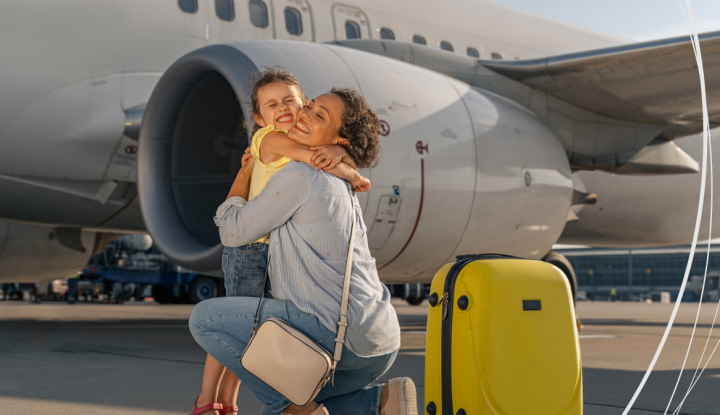What is your cost of choosing the wrong technology partner?

LCC Market Dynamics
For the past five years, low-cost carriers (LCCs) have been growing at a rate of five times faster than full-service carriers (FSCs). And while the road to COVID-19 recovery is a long one, many predictions are already pointing to LCCs continuing that trend1. With IATA projecting that global passenger numbers will surpass pre-COVID-19 levels in 20232, what can LCCs do now to ensure their continued success?
First, it is important to take a deeper look into why the LCC marketplace has been able to make a quicker recovery. In today’s climate, an increase in “work from anywhere” corporate policies, international travel restrictions, and quarantine rules have decreased the immediate need for long-haul business travel. LCCs are well-positioned to cater to the domestic and short-haul travel markets thanks to their point-to-point routes and the secondary destinations they serve. It is also likely that travelers feel safer flying shorter distances without connections, reducing their physical airport touchpoints.
The Global Business Travel Association (GBTA) predicts that business travel will fully recover by 2024 – a year earlier than originally predicted3. When we look at LCCs, their recovery began in the back half of 2020. In Europe, for example, LCC activity reached its height in August 2020, mostly due to leisure travelers rebounding quicker than business travelers. LCCs are likely to have an advantage in a price-sensitive and regionally-focused travel market.
As a result of COVID-19, there has been an increase in start-up LCCs and low-cost sister airlines as others attempt to capture their part of the recovering LCC market.
This increase in LCC start-ups, coupled with slower FSC recovery, has led to a temporary decrease in competition from legacy airlines, at least in the near-term. LCCs need to take advantage by growing their market share and building customer loyalty while the FSC market catches up in recovery.
The global LCC market is expected to exceed $247 billion by 2025, driven mainly by an increase in air passenger traffic and investments made by major airlines in the LCC sector4. At the conclusion of 2021, LCCs made up nearly 32% of the worldwide airline market.
Global Low-Cost Carrier Market Growth ($ US Dollars)

As of March 2022, Ryanair was the largest airline in Europe (by passenger number), and LCCs made up several more in the top 105. According to data from the Centre for Aviation (CAPA), from 2009 to 2019, LCC market share in Europe rose from 23.9% to 33.1% (peaking at 35.5% in 2017).
According to IATA, 80% of airline seats globally are on routes with at least two competing carriers and at least 30% have five competing carriers. What does this mean for the rest of the LCCs? The increase in LCC competition may lead to downward pressure on price. This means airlines will need to put strategies in place to compete and win.
To lead their growth post-Covid-19, LCCs will need:
- Customer-centric experiences that unlock incremental revenue
- Increased operational efficiency with modernized solutions
- Reliable technology that allows them to scale up and down with demand
- End-to-end partner with global expertise to implement quickly
Airlines, now more than ever, need efficient systems in place to manage costs and turn flights around quickly – especially as increased cleaning protocols are put in place between flights. This means increasing efficiency in the areas of check-in, bag handling, catering, refueling, and boarding.
Without sufficient differentiation in offers, price becomes the lowest common denominator, resulting in a spiral-down behavior. Personalized offers are another way to generate sufficient differentiation with customers by providing higher value to each traveler. With an increase in start-up LCCs, it is imperative that technology enables airlines to differentiate their offers and provide personalized travel experiences that will increase customer loyalty. Overtime, passengers have grown to expect this level of personalization. In the near term, personalization will be enabled by AI/ML technology.
To compete in the marketplace, airlines will need technology systems that enable them to scale up and down and ensure reliability during peak times. Technology must allow for rapid innovation cycles to test and learn that necessitate quick deploys with little or no downtime.
The winners will be those airlines using technology providers with expansive industry expertise and systems that enable airlines to increase operational efficiency and scalability and provide the ability to differentiate their offers.
What is the true cost of choosing the wrong technology provider?
As we look at the three points mentioned earlier, only one is about operational efficiency, the other two are about leveraging technical advantage to grow revenue and market share. The ability to let travelers search and book travel is merely a starting point. While a breadth of features – from search to book to consume travel – is necessary for any technology provider in this space, it is the depth for each of these features that differentiates great solutions. Some technology providers in the travel marketplace offer a narrow perspective on what their solutions should entail. These players offer breadth – introductory-level support of most functions needed by an LCC – but they lack depth – deeper, more robust support of those functions and more.
To better compete in the market, LCCs need to differentiate themselves in the areas of personalized offers, innovations around ancillaries, new products, and pricing recommendations. These areas require robust technology solutions that scale along both functional and technical dimensions. Since airline and technology provider relationships are a long-term commitment, it is important that airlines consider their long-term vision when choosing their technology partner. One of the primary concerns of any business is the price for its technology. However, one does wonder how much of the pricing decisions may end up looking myopic from the perspective of lost opportunity. Airlines need to consider whether the technology provider has the functionality to adapt to the evolving business models of the airline over time. If so, how deep does their support go? Such long-term decisions made solely based on price will not sustain the airline in the long term. More mature LCCs require a technology provider that offers the breadth of functionality needed today and the depth to support them in five years in order to avoid the cost of migrating systems or adding custom development – a cost that is undeniably much higher to the airline. Next, we will explore examples of breadth versus depth.
Breadth vs. Depth: How robust is the technology provider’s offer?
Retailing
Over the past ten years, the airline industry has become more dependent on ancillary revenue as airlines attempt to improve their margins. In 2019, total ancillary revenue in the global airline market reached $109.5 billion. In 2020, we saw a 47% dip to $58.2 billion due to the COVID-19 outbreak6. Ancillary offers have mainly focused on services like hotel or car reservations, travel insurance, and vacation packages, but it may not be a surprise that the second largest ancillary revenue comes from baggage fees and on-board retail7. Yet, most technology providers that claim to support retailing do so with limited depth.
Statista: Total Ancillary Revenue in the Airline Industry from 2011 to 2020 (in billion US dollars)

To excel at retailing, an airline needs a technology provider who offers a high level of self-service that enables them to roll out new offers and promotions within minutes across all distribution channels. Many technology providers require custom development to add offers to any distribution channel, costing the airline lost revenue over time.
Built from the core to be an offer-order retail-centric system, Radixx’s modern passenger processing system, Radixx Res, and its advanced retailing module, Radixx Retailer, provides airlines with the ability to set up offers themselves based on flexible parameters within a matter of minutes, no development intervention required. Enabled by a user-friendly Content Management System, Radixx ezyCommerce™, airlines are empowered to manage their digital content.
The depth of solution necessitates effective retailing with high levels of self-service by airlines in creation of product, bundles, promotions, and pricing. Any solution that requires intervention by the solution providers can negatively impact the revenue opportunity within retailing.
Departure Control System
There is a breadth of operational functionalities that a technology provider may claim to offer an airline. But how deep do those offers go? Most Departure Control Systems (DCS) will have standard check-in and boarding functionalities, however, there are hidden costs when the DCS passenger processing times lag or it is unable to take payments after check-in. The airport is an important customer touchpoint to create an enjoyable travel experience and to increase retailing opportunities. Without a good depth on operational efficiency as well effective retailing capabilities in the DCS solution, passenger processing times will lag, and airport operational efficiency will cause an undesirable revenue impact, while lack of effective retailing will result in loss of revenue opportunity.
One solution that is paving the way for increased operational efficiency is the Radixx Go™ Departure Services solution (DCS). With the ability to run entire airport operations with a smartphone application, Radixx Go™ supports not only retailing at the check-in counter, but throughout the entire airport journey helping the airline in its efforts to uplift revenue by increasing the number of customer touchpoints (think hotel lobby, check-in counter or kiosk, airline lounge, curbside, and more). The robust solution offers one order store for all points of sale.
Now more than ever, traveler safety is a major focus with processes like social distancing and cleaning protocols in place. To enforce social distancing, Radixx Go™ reduces queue times and speeds up pre-flight preparation by automating once-manual check-in processes. Passengers have the option to check in prior to arriving at the airport, at a kiosk, or using one of the airline’s “roaming agents.”
An additional value-add to Radixx’s robust departure services solution, and further proving the depth of their offer, is Radixx Go™ Touchless, which introduces biometrics to enable complete contactless operations to streamline the travel journey and further reduce concerns surrounding returning to normal travel activities. This is the type of depth that airlines need in their technology to win the confidence of travelers post-COVID-19.
Connectivity
As competition has intensified over the past decade, LCCs have adopted business models that include some level of Global Distribution Systems (GDS) connectivity to expand their market reach. However, the levels of support that technology providers offer when it comes to connectivity vary greatly. It is important to consider what type of connectivity the airline will need today and in the future. Will the chosen technology partner support the airline as they grow?
Radixx, a Sabre Company, offers various GDS connectivity including interline and codeshare and now supports Outbound Interline and Codeshare connections. Integrated with Sabre shopping for ATPCO formatted fares, Outbound Interline and Codeshare is an integral part of the Radixx Res PSS allowing agents to fully service bookings. Radixx supports robust connectivity functionality including ticketed and ticketless capabilities.
Sabre is now certified as both an NDC aggregator and as an NDC airline IT provider under the new IATA Airline Retailing Maturity (ARM) index program. Certification for the Sabre products under the Radixx portfolio for low-cost carriers (LCCs) will become ARM index certified as part of their strategic roadmap. These certifications reflect Sabre’s commitment to developing scalable NDC capabilities that support offer and order-based travel retailing. Artificial Intelligence (AI), Machine Learning (ML), and Cloud Hosting
Artificial intelligence is gaining popularity in all industries, including aviation. In today’s data-driven world, airlines can use artificial intelligence to collect and analyze flight data including routes, aircraft type, weight, weather, booking loads, and more to increase their route efficiencies. Other airlines are finding the more data their AI and ML systems gain, the more efficiently they can dynamically price tickets.
Radixx and Sabre are taking bold steps to transform the travel marketplace by partnering with other technology leaders that have exceptional strengths to offer breadth and depth that will drive the industry forward. As announced in January 2020, Sabre has entered a 10-year strategic partnership with Google to innovate and digitally transform the future of travel. This includes migrating to Google Cloud’s highly available and secure services. Today, the vast majority of Radixx solutions are already cloud-enabled with the full suite expected to be on the Google Cloud Platform (GCP) in 2022. This will provide airlines with further scalability and proximity to customers through multiple geographic landing zones.
Sabre and Radixx will also use Artificial Intelligence and Machine Learning Google Cloud Tools to enhance the capabilities of future products and provide insights to create optimized travel offers. The Sabre + Google partnership means a richness to the data providing not only booked data but flight search data that gives insights into customer demand signals.
All technology providers offer basic functionalities of workflow automation. But can they enable revenue growth and efficient operations consistently as business needs evolve for the airline? What happens when an airline chooses a provider based on the lowest Passenger Booked (PB) fee offered to them and doesn’t consider their needs in one, three, or five years? Many vendors will drive a sale based on initial cost, but the winners will be those airlines who think beyond initial cost and choose a technology provider with both breadth and depth in their solutions.
There is lost revenue opportunity that is recovered and further improved upon when an airline selects a provider, such as Radixx/Sabre, that offers depth. Often, a system with limited depth has much higher cost than is visible in the initial PB fee, and once we start including lost revenue opportunity, the cost incurred may become intolerably high. Further, there are the long-lasting impacts of these inabilities of a system that constrain people’s thinking beyond what may be possible today. That’s a cost that one may not be able to recover anytime soon.
The Platform of Choice for LCCs
Radixx is gaining momentum as the platform of choice in the LCC and hybrid airline market, partly because from inception, Radixx was built around the core concept of customer-centric retailing. Its modern, microservices-based infrastructure means that the Radixx system is modular and therefore is not hindered with the technical challenges and legacy models of its competitors. Together Radixx and Sabre offer the marketplace a segmented set of solutions that meets the needs of the broader aviation market with much greater depth.
More LCCs are selecting Radixx because of their modern infrastructure, superior retailing, modular ecosystem, passenger processing capabilities, and lower total cost of ownership.
- Agile, invoice-based core PSS out of one database
- Vast majority cloud-enabled for stability and elasticity
- Microservices based, modular architecture for easy integration with partners and internal apps
- Rapid innovation and deployment cycles for fast speed-to-market
- Ability to retail across all channels with setup done on the airline side in minutes
- Flexible engagement models
Radixx/Sabre differentiators
Proving their commitment to the LCC segment, Radixx and Sabre had each been underway for some time on a journey to enable airlines with IT capabilities and intelligent software to retail, distribute and fulfill personalized offers through all channels. The depth of the Radixx and Sabre offering is made possible by their global client base and industry expertise enabling airlines to reach their goals faster with industry leading delivery and support. This type of technology provider is what is required for airlines to innovate and be successful in the market.
While market dynamics beyond COVID-19 mean a need for airlines to efficiently manage costs, it is imperative that they continue forward with a long-term vision in mind as well.
The airlines that seek to bring long-term value to travelers will also enable themselves to deliver long-term returns to their airline.
Additional References:
About Radixx
Founded in 1993, Radixx was built to offer a retail-centric alternative solution to legacy PNR-based reservations systems. At its core, Radixx has leveraged the technology industry’s rapid advances to take advantage of cloud-based solutions that quickly deploy and provide maximum stability. Radixx caters to LCC, ULCC, and hybrid airlines, including the support of GDS distribution.
The Radixx airline retailing, distribution, and fulfillment solutions combine retail best practices and airline expertise to enable airlines to become effective retailers and efficient operators. Their solutions span an Internet Booking Engine, Radixx ezyCommerce, a cloud-based Passenger Services System, Radixx Res, a leading Departure Services Suite, Radixx Go, and a revenue optimization tool, Radixx Insight. Each Radixx solution is uniquely designed to enable airlines to increase their profitability, realize efficiencies, increase scalability, and optimize stability.
Sabre acquired Radixx in October 2019 as part of the technology company’s entrance into the fast-growing LCC and Hybrid segment.
About Sabre Corporation
Sabre Corporation is a leading software and technology company that powers the global travel industry, serving a wide range of travel companies including airlines, hoteliers, travel agencies and other suppliers. The company provides retailing, distribution, and fulfilment solutions that help its customers operate more efficiently, drive revenue and offer personalized traveler experiences. Through its leading travel marketplace, Sabre connects travel suppliers with buyers from around the globe. Sabre’s technology platform manages more than $260B worth of global travel spend annually. Headquartered in Southlake, Texas, USA, Sabre serves customers in more than 160 countries around the world. For more information visit www.sabre.com.
1 Cirium COVID-19 Impact European Low-Cost Carrier Market. https://www.cirium.com/thoughtcloud/covid-19-impact-european-low-cost-carrier-market/
2 https://airlines.iata.org/news/optimism-for-travel-restart-as-borders-reopen
3 Business Traveller Business travel expected to fully recover by 2024 – Business Traveller
4 Statista – Low Cost Carrier Market Size Worldwide. Published January 2021.
5 Simple Flying – Low Cost Airline Competition. December 2020.
6 Statista – statista.com/statistics/788849/airline-industry-ancillary-revenue/
7 Statista – statista.com/statistics/788849/airline-industry-ancillary-revenue/






